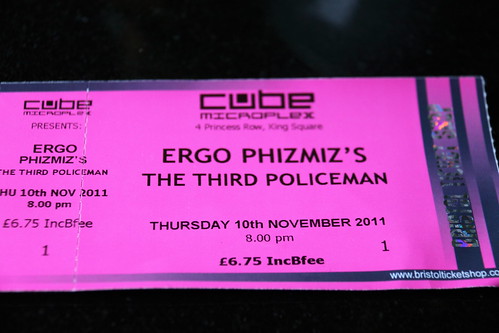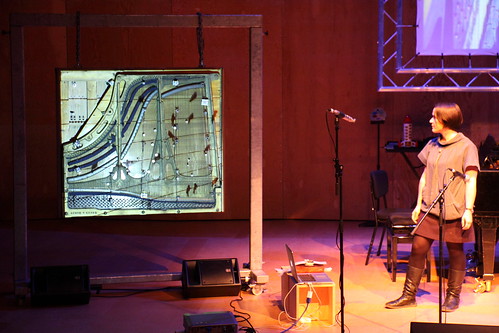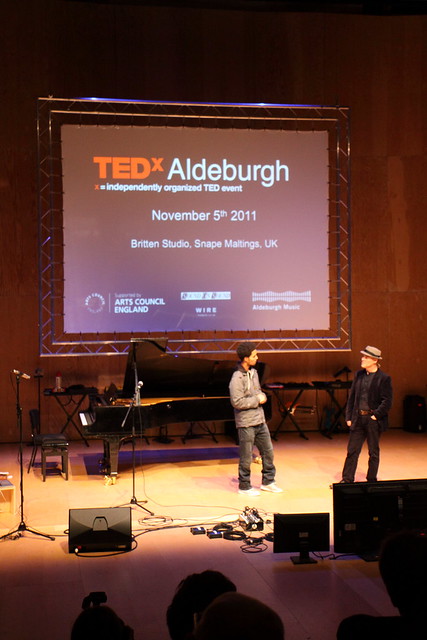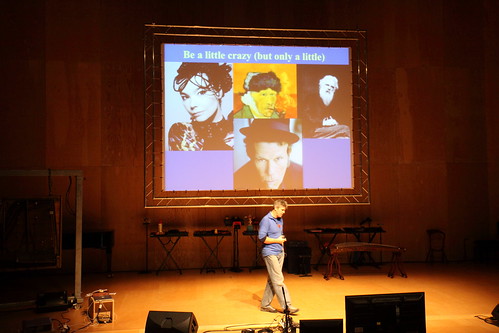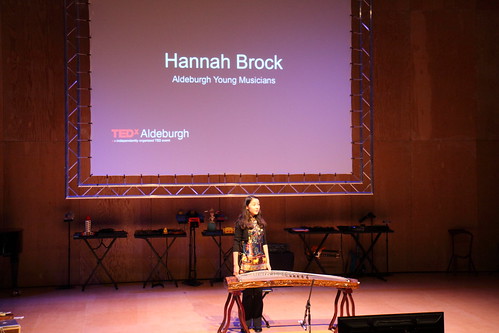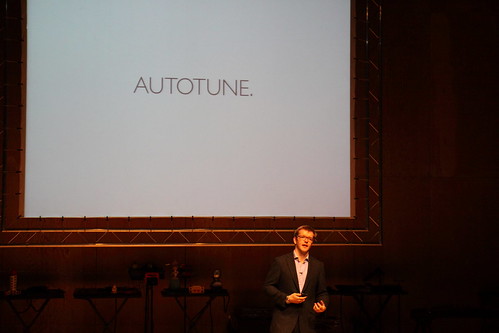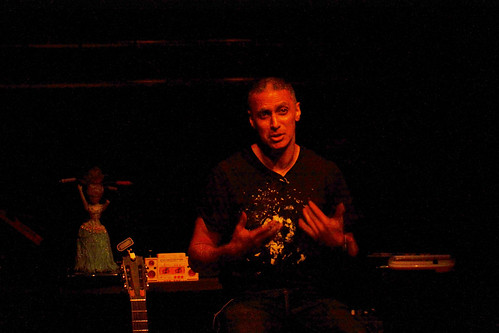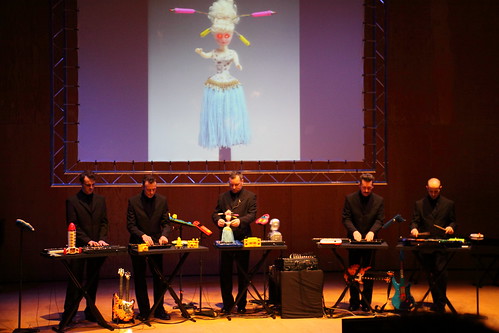After yesterday's garden clearance, the sunlight is streaming into the living room and it feels good. I can tell we're not far off the winter solstice now, because the sun only rises above the roofs of the houses on the other side of the road at around 10:30 am. As I get older, I've found I notice yearly cycles far more, and I'm beginning to understand why our ancestors found the passage of the seasons so significant. But this autumn has been markedly different from last year's. On BBC Autumnwatch on Friday night John Hammond said average temperatures this month have been more than 3°C higher than average and while we're unlikely to break the record temperatures set in 2006, it has been unseasonably mild. A set of ducklings has hatched at Slimbridge, just up the road. Mallards don't normally hatch after the end of August. When you consider that around this time last year I was snowed in at my brother's house, it does make you stop and think...
I had a chuckle at the permutations on the "giant robot on way to Mars" headlines yesterday evening after the Mars Science Laboratory and the Curiosity Rover were successfully launched on an Atlas/Centaur rocket from Cape Canaveral. I love the fact that the rover tweeted "It's a new dawn, it's a new day, and I'm feeeeelin' good" after the launch. I also love the fact that I was able to watch the whole thing over the Internet on NASA TV.
MSL launched at 15:02 GMT. A couple of hours later and I wouldn't have been able to watch, however. My broadband connection has been suffering very badly over the last month from what's become known as the Internet rush hour. Every year since I've had broadband, things deteriorate in between the schools going back in September up to Christmas. Download speeds in the evenings drop off significantly. Here, the reduction is much more than 69% as I will quite regularly lose my connection entirely. Things started to drop off yesterday at 5pm and by 7pm I'd given up - pages just weren't loading at all.
William Gibson's 2007 novel Spook Country featured the mysterious contents of a shipping container which attracted the attention of a variety of very interesting characters. In 2011, a shipping container at an Italian seaport was attracting some attention of its own. The story is a remarkable one, and it leaves a lot of disturbing questions unanswered, not least of which: where did the contents come from, who loaded it, and are they still alive?
A few years ago I came to the startling realisation that I've suffered from depression, on and off, for most of the last two decades. "How can you not know you've got depression," I can hear you thinking. The simple reason is that I didn't know that what was wrong with me even had a name, let alone that it was something well-studied, because I'd never read an account that matched how I felt. Even when I found a copy of Anthony Clare and Spike Milligan's book on Depression and How to Survive It I wasn't sure that was what was wrong with me. I'd assumed that the symptoms of depression were that you were sad all the time, with a lot of crying involved. Of course, that's not how it works. It's far more complicated, and each time it hits, things change. I wish back then I'd been able to read something like the piece that the footballer Stan Collymore wrote this week, which is about the clearest description of fighting depression I have ever read: "Being unable to lift my head from the pillow, feeling like my body had been drained of any life, my brain "full" and foggy, and a body that felt like it was carrying an anvil around" - I know exactly how that feels, because I've been there many times myself. In that state, the world outside your window ceases to hold any attraction. You collapse in on yourself, retreating to your bed in pursuit of one thing: sleep.
The insomnia that Stan describes, driven by an "incredibly active, negative mind" is the worst part of it all. For me, I am convinced that it's the driver of the condition. Anyone who underestimates the healing properties of sleep has never lived with not getting enough of it. The crushing, soul-destroying experience of lying in bed, still awake, at five o'clock in the morning when you know you've got to get up and go to work in ninety minutes; of getting home in the evening so tired that you can't keep your eyes open, and yet when you finally climb into bed you're deluged with anxieties and worries about the following day that will not stop, leaving you fretting and thrashing from side to side under the covers, trying to escape from something that will not relent unless - if you're lucky - the body finally decides enough is enough, exhaustion kicks in, and you sleep for twelve, eighteen hours at a stretch and recover enough to get up and start it all over again. I made a conscious decision to be open about my depression a few years ago, because I remember what I went through. I have no hope of reaching people in the numbers that Stan will, but if I can help to educate people about what depression is, if just one person reads this and realises that treatment exists and that the situation is not as desperate as it seems, then it was worth doing.
As for me, I've been off antidepressants for over a year now. I'm not cured; the condition doesn't work like that, but managing my sleep environment has helped me a lot. There's no phone in my bedroom, and I moved the computer downstairs. I move from Internet reading to books half way through the evening, and I lay off the creative activities like writing or music after ten o'clock or so. It doesn't always work and when my job gets particularly stressful I still struggle; my mind still races, but I do manage to get enough sleep to hold the black dog at bay. I haven't had a night with no sleep at all for several months now.
And it may sound trite and clichéd, but physical work helps me a lot. Today I spent a couple of hours in the garden cutting back the magnolia tree and the sense of achieving something as a result is good, strong medicine. Not only that, I can now see the world outside my window again, both metaphorically and literally.
Even though it's starting to get dark by half past three in the afternoon it hasn't felt like winter; daytime temperatures this week have reached the mid teens, according to the weather forecasts I've seen. It might change tonight, though: they're predicting a frost. Despite the unseasonal conditions I've been listening to a decidedly wintry album this week: the new CD from Kate Bush arrived yesterday and I've been listening to it on headphones and speakers ever since. 50 words for snow is her second album this year; it's a collection of songs set in a cold, bleak landscape, dealing with nostalgia, isolation, and melancholia yet the album is full of richness and warmth, thanks to her quite extraordinary voice. The musical arrangements are frequently pared down to piano and vocals and there are few artists these days who can hold up to scrutiny under such unrelenting attention, but Kate Bush seems to revel in it. Her vocal control is truly remarkable and she still takes full advantage of the massive range she wowed us with thirty years ago. This is a recording that has no need of autotune; this is about voice as a musical instrument rather than technological creation.
I must admit I was taken aback the first time I heard the first track, Snowflake. I remember thinking "what has she done with her voice?" The accent and the pronunciation sounded the same, but what was going on? A quick glance at the sleeve notes revealed the singer to be Albert McIntosh, Kate's son. It's not the first time he's appeared on his mum's work, but hearing the two of them singing together here brings home how remarkably similar their voices can be. There are some other great vocal performances, too from Andy Fairweather Low, Elton John and Stephen Fry (who has to recite Kate's made-up words for snow on the album's title track - not only is word number 42 in Klingon, the language's creator Mark Okrand gets a nod in the credits!)
Best of all, the impeccable mastering has left the recording with room to breathe. So many modern albums leave you feeling exhausted and fatigued afterwards, overusing compression and setting the levels much too high. In contrast, 50 words for snow leaves me feeling chilled (what an appropriate word) and satisfied in a way that few albums manage to do.
The National Geographic magazine is running a photography contest. The Atlantic has a page full of selected entries, and they are extremely good - and by that I mean "well, there's absolutely no point in me entering" good.
Meanwhile there's Hollywood's approach: if it works, copy it (and while the site's in French, you don't have to be a francophone to get the point.)
Okay, so recreating scenes from movies is not a new idea, but when it's done with the verve and passion of young Arthur here, it doesn't really matter. My favourite is most definitely his take on a pivotal moment from Close Encounters of the Third Kind.
The older I get, the more I realise how important music is to my wellbeing. Having music playing in the background always makes me feel better, and over the past couple of weeks I've been listening to everything from They Might Be Giants, the Mystery Fax Machine Orchestra and the Modified Toy Orchestra to Sir Christopher Lee and William Shatner.
Listening to other people's music is only half the story, though; I also love creating music of my own. It's one of the most therapeutic activities that I know of. So here I am, improvising along to the KARMA automatic accompaniment system on my Korg M3 last night...
KARMA is seriously clever software, developed by Stephen Kay (KARMA stands for "Kay Algorithmic Realtime Music Architecture") in order to let keyboard players get by when the rest of the band isn't available. Just watch Stephen's demo video to see exactly how amazing the system is.
Recording last night's efforts has made me determined to get back into the habit of recording music. I may have crashed and burned on Nanowrimo this year but FAWM will be coming around again in February and I am going to try very hard to make my 2012 effort better than this year's. With gear like the M3 I really don't have an excuse.
After another week I still feel distinctly below par. I hoped that spending yesterday afternoon doing a few hours of gardening would help me to sleep better, but it didn't happen. Dinner tonight will therefore feature large amounts of steamed vegetables; I am going to try and eat more healthily this week before the season of mince pies and selection boxes hits us...
I still haven't got rid of the cold I caught a couple of weeks ago, and after a fortnight of rushing round attending gigs and conferences and what have you, I'm chilling out at home this weekend. I use the expression chilling out advisedly, because I'll be watching the latest episode of the BBC's amazing new series Frozen Planet later this afternoon. It's one of the best things I've seen on TV in years and in HD it's breathtakingly beautiful. I've been a fan of Sir David Attenborough's work since I read my grandmother's copy of Zoo Quest for a Dragon as a small boy and more than fifty years after he began his wildlife film making career he's still coming up with the goods.
I'm not doing so well at coming up with the goods at the moment, I'm afraid; being under the weather has meant I've rather let Nanowrimo get away from me this year. I made a start on the 1st November and after a couple of thousand words I decided things weren't going anywhere and started again. I got roughly 4500 words down at the second attempt, but again I decided that the story really wasn't catching fire. Last weekend I took a break to head over to East Anglia, but I harboured hopes that I might suddenly get my creative mojo back this weekend and reclaim my word count in a blazing fire of literary abandon. Instead I've spent the last couple of days mooching around the house and the only thing that I seem to be any good at producing at the moment is phlegm (and you didn't need to know that, I'm sorry). My sole achievement this weekend looks likely to be that I got the laundry done.
On Thursday night I was back in Bristol for an evening at the Cube Microplex and a performance of Ergo Phizmiz's opera based on Flann O'Brien's novel The Third Policeman. (Disclosure: I've been following Ergo's work for years and I helped a little bit with production funding.) I took it as a good omen when my ticket arrived and I noticed that it was ticket number 1...
Ergo was ably assisted by Eric Bumbledonk, Oblivian Substanshall and Vulnavia Vanity. The performers sing live over a recorded musical soundtrack which was combined with a back-projection video feed, complete with live performance shadow puppets; I've never been to anything quite like it. Despite the minimal budget the staging was inventive and several sequences in particular were striking: the unsettling shadow as the protagonist sits typing; the point where he robs Mathers; the appearance of Sergeant Pluck and Policeman MacCruiskeen for the first time (and thanks to the fine work of Martha Moopette, the two policemen were the most visually impressive aspect of the show). The opera follows the book quite closely, and while I'm not going to spoil the plot by discussing it in detail, I will say that it ably represented the unsettling nature of the book.
The soundtrack riffed on many of Ergo's obsessions so we got songs reminiscent of Kurt Weill, tweeting birds, sampled 1920s jazz, wildtrack atmospherics, falsetto vocal harmonies and more. The Cube was busy, which was good to see, and the audience reaction seemed very positive. Thursday was the last night of the current tour, but if Ergo and the gang decide to perform it again, I really recommend going. And keep an eye out for his next musical adventure, as I'm sure it will be just as stimulating!
I was at the O2 Academy in Bristol last night to see the Swedish metal/prog phenomenon Opeth, who were ably supported by another Swedish prog rock band, Pain of Salvation. I had a blast - although it's difficult to imagine any acts that could contrast more with the Modified Toy Orchestra I was listening to on Saturday night.
Opeth are in the middle of a fairly major change in musical direction, as they've dropped the screaming or guttural vocals of earlier albums in favour of finely-nuanced melodic harmonies which reminded me favourably of Jethro Tull. This proved to be too much for one guy in white hipster glasses and a very expensive-looking leather bike jacket who was standing at the bar giving anyone who didn't get out of range fast enough the benefit of his considerable opinion. As Opeth's set progressed he became more and more vociferous (I could hear his ranting over the band, that's how shouty he was) but to my great relief when the band brought out some acoustic guitars he finally gave up and buggered off, leaving the rest of us to enjoy the music in peace.
It's been a busy few days. I spent Friday and Saturday in Suffolk, meeting up with friends (and having a very nice meal at the Plough and Sail at Snape). I was there for a couple of events taking place at the Maltings; on the Friday night I had a front-row seat for the first gig in Thomas Dolby's UK tour. He was promoting his first new studio album in the best part of 20 years, A Map of the Floating City, and very good it is too.
I've been a fan of Thomas's for many years. The Golden Age of Wireless was the second CD I ever bought, and when I worked in Tampa I listened to Astronauts and Heretics at least once every day - I was completely obsessed with it. I bought the preview download EPs (and the Oceanea T-Shirt as well) from the Flat Earth Society message board and I watched a live stream of Thomas's recent gig at Chepstow live over the web. As a result, I knew pretty much every song in the set so I was nodding along enthusiastically. The band were good (guitarist Kevin Armstrong and bassist Matthew Seligman both played on the Golden Age of Wireless) and when things occasionally went awry they dealt with things admirably. When the gig finished a bunch of us adjourned back to the pub, where we indulged in the very un-rock & roll practice of drinking copious amounts of Earl Grey tea until closing time.
After that I drove through thick fog back to Southwold, where I'd booked into a room at the Swan Hotel. It was the first time I'd stayed there in 18 years. It's still a little haven of calm and tranquillity, even if things were rather quiet: at breakfast on Saturday morning there were only three other guests.
After checking out of the hotel on Saturday I went for a quick stroll down the high street before leaving Southwold and heading back to Snape. You may remember that last year I had a great day at Aldeburgh's first TEDx conference and when I found out that Thomas Dolby was organising another you can bet I snapped up a ticket as quickly as possible. I'd raved about how good it was last year so much that this year I was joined by a couple of my friends, and I think they enjoyed themselves as well. There was another fascinating and eclectic set of presentations this year...
Kathy Hinde talked about a number of art projects which take their inspiration from photographs and video of flocks of birds. "Piano Migrations" used video of swallows on telegraph wires projected onto a suspended upright piano frame. When an image of a bird interacted with a photodetector on the piano, it triggered a solenoid which plucked or hit part of the piano which had been prepared, John Cage style, to make some faint, ethereal noises. It was quite something. Kathy was followed by Jennifer Stumm, who shared her passion for the humble viola; after listening to her play I could understand why she finds the instrument so alluring. Then hip-hop artist Akala showed us how closely modern lyrics parallel the work of Shakespeare. He was a really great presenter - after explaining how iambic pentameter is based on the human heartbeat and showing how it can be applied to hip-hop beats he set us a challenge, throwing a dozen or so quotes at us and asking us if we knew whether they were by the great bard or (for example) the Wu-Tang Clan. It was much, much harder than it sounds and I don't think anyone got full marks. That's OK, Akala explained - even when he gives presentations to English academics, nobody ever gets them all right, which made me feel a little better.
After lunch, Professor Vincent Walsh of UCL talked about the neurological basis for the creative act. Even before I got involved in the educational psychology side of things I was fascinated by neuroscience, so I was in geek heaven. He had an impeccable collection of people on his PowerPoint slides, too - everyone from Bjork to Richard Feynman and Eadweard Muybridge to Oscar Wilde by way of Tom Waits...
Aldeburgh's Chief Executive Jonathan Reekie introduced one of the younger members of Aldeburgh's Young Musician project.
Hannah Brock plays a Chinese harp called a Guzheng and she performed a Chinese piece called "the flight of the typhoon" for us. She's an amazingly talented musician and she's just 12 years old. Jonathan explained that she's currently receiving lessons from her teacher in China over the Internet using Skype, which completely blew my mind.
Cellist Peter Gregson returned to TEDx to give a talk about pitch and how it's been affected by developments in technology from the beginning of the 18th century. I'm sure I wasn't the only person who shuddered when this slide appeared (and is that an expression of pain on Peter's face?):
After a break for a coffee it was back to the Hoffmann building for the last set of talks. If Professor Walsh gave us a glimpse of the "how" of the creative act, Nitin Sawhney provided an insight into the "why" - his talk was titled "What is the point of music?"
He's a lovely chap, and his talk (delivered in semi darkness) was the high point of the day for me - especially when he finished by playing Prophesy on acoustic guitar for us!
After a TED video presentation about the Large Hadron Collider from Professor Brian Cox (he gets everywhere), proceedings were concluded by the Modified Toy Orchestra, who use customised home keyboards and children's toys as musical instruments...
Their performance was a hoot, with a Texas Instruments Speak and Spell battling for vocal dominance over a garishly coloured plastic toy that made barnyard noises and I instantly became a fan. I'm listening to their album Plastic Planet as I type this and it's fantastic stuff. After geeking out over all the old Casio keyboards (acquired, I'm told, for peanuts at car boot sales and via eBay) I bade farewell to Snape for another year and headed north to Dad's, where I spent the rest of the weekend. Dad and I went out to dinner with my sister Annabelle and her family on Sunday evening and I got home in the early hours of Monday morning.
It's been an intense, but very enjoyable few days.

